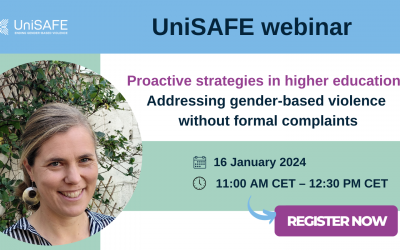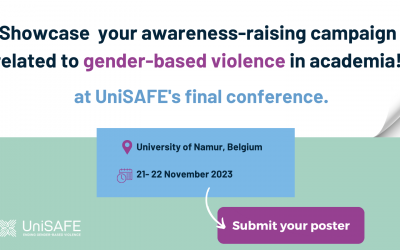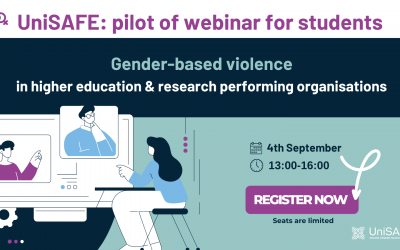“Universities are shaping the minds of the future generations, which we would all like to be free from harmful gender stereotypes, sexism, and violence against women”,
said Johanna Nelles, the Council of Europe’s Head of the Unit on Violence against Women and Executive Secretary to the Istanbul Convention, praising the UniSAFE project during the UniSAFE Community kickoff meeting.
Addressing the UniSAFE community of institutions in her keynote speech during the meeting, Mrs Nelles saluted the project and its practical implications, stating that “filling in the data gap on gender-based violence is crucial for a successful implementation of the Convention”.
She then sketched the legal framework the Istanbul Convention offers for UniSAFE’s tasks in generating new knowledge. The Istanbul Convention, which has recently marked its 10th anniversary, recognises violence against women as a violation of human rights and a form of discrimination against women. It is one of the most far-reaching international legal instruments to set out binding obligations to prevent and combat violence against women. Over the past 10 years, it has guided numerous states in advancing their legislation and policies to prevent and combat violence against women effectively. She also provided examples of promising practices and implementation that have emerged from monitoring the Convention.
“As someone who has worked on the Convention from the beginning,” said Mrs. Nelles, “I am very happy to see this initiative taking shape, and even happier to see it happening within the framework of the Convention itself.”
The Convention represents a benchmark for the UniSAFE project, which builds on its four pillars and further expands them to reach a more comprehensive understanding of gender-based violence in academia.
Mrs Nelles praised other initiatives that bring together universities to eradicate gender-based violence, such as the UNIRE network in Italy, working to implement the Istanbul convention as a point of reference, and the Council’s own initiative to strengthening its cooperation with universities and research institutions, the Open Council of Europe Academic Networks (OCEAN).
Johanna Nelle’s speech is on replay here:



